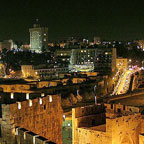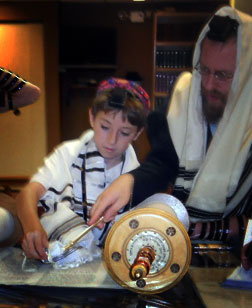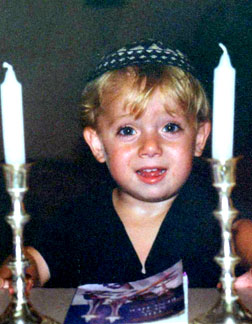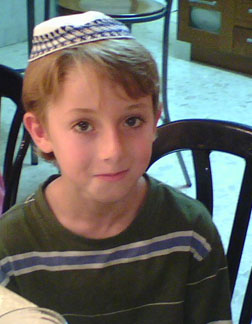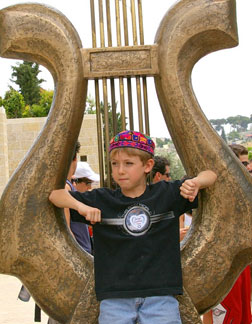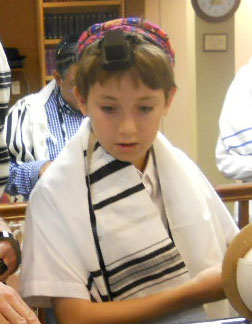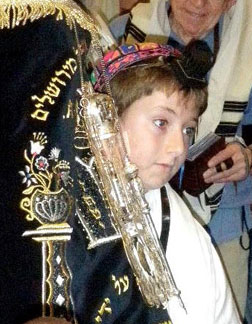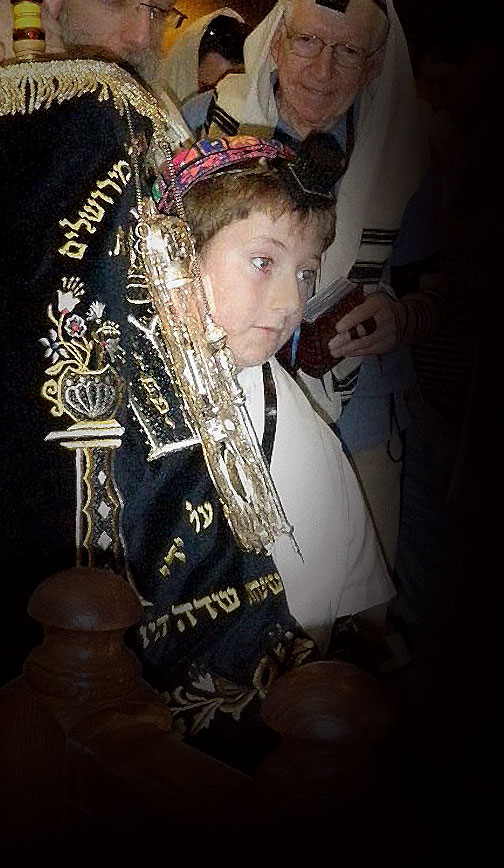

![]()
Barak Rodich
Son of
Rick & Dvora Rodich
Invite you to celebrate with us
his Bar Mitzvah
Please join us and be a part of this special time in our lives, as we continue a tradition of that has been fulfilled by generations before us.
October 22, 2011
7:00 PM
@
Temple Beth Israel Ballroom
10460 North 56th Street
Scottsdale, AZ 85253-1133
RSVP Email Dvora1179@gmail.com
or click e-mail below:
R.S.V.P. online
WHY CELEBRATE A BAR MITZVAH?
Jewish law holds parents accountable for their children's misdeeds. And since moms and dads, as of their child's "coming of age," are now no longer liable if their little darling cause damage, steal or lie, it's cause for celebration. It is also a reason to be joyful for the bar mitzvah boy is now at the age when personal responsibility dawns. This new accountability is cause for celebration - for both, the parents who are no longer "blamed" for their child's misconduct, and for the child can now be proud of the new responsibility.
For many children, preparing for a bar mitzvah ceremony a highlight of their growing awareness of Judaism and is a moment when they are the center of attention (a most craved position). To participate in the service gives a sense of belonging. To be the focus of all the fussing provides a sense of importance. .
Furthermore a bar and bat mitzvah is timed to coincide with the first stretch of adolescence. As a teen reaches for identity throughout these rocky years, bar and bat mitzvah memories fend for what it means to be a Jew. In the best case they will foster a sense of connection with all Judaism has to offer
How can a 13 year old be considered an adult?
Some Bar Mitzvah boys expect to wake up feeling different on the morning of their Bar Mitzvah. They run to the mirror to see if any sign of a whisker has appeared on their chin, or start talking to themselves to check if their voice cracks. But the change that happens on the Bar Mitzvah day is much more subtle than that. The maturity reached at age 13 is not one that allows you to buy alcohol or decide your own bedtime – it is a spiritual maturity.
What do you mean by spiritual maturity?
The definition of spiritual maturity is the ability to experience the depth and complexity of life.
A child can only see the world in one way. If his parent forbids him to eat a chocolate, he says, “I hate you!” with venom. At that moment, he means it. You can’t rationalize with him by pointing out that you always buy him lollies and he will be able to have it after dinner and it is for his own good and you are his parent…These are meaningless words. There is only one reality for him: you didn’t let him have the chocolate so you are BAD. Of course, if you give in and allow him to have the chocolate, you are “the best parent in the world” and all is forgotten. For the child there are only extremes. In his yet under-developed mind, every situation is simple and one-sided, black or white. There are no shades of gray.
This is a reflection of the purity of childhood. Children experience pure and unadulterated happiness, all-consuming sadness, extreme anger and uninhibited excitement. This is a necessary stage for them to develop as wholesome beings. Each of these emotions must find its independent place in the child’s identity before they can start to work together.
With maturity comes the ability to sense subtlety and nuance. Our minds expand to be able to appreciate that even though something seems painful, there is a deeper good. And the things that feel good are not always good for us. An adult can say, “Although I am upset at you, I still love you.” Or, “Although I want it, I know it’s wrong.” We can see beyond the surface. Life is no longer one-dimensional; it has a depth and a complexity of which children are blissfully unaware.
What suddenly happens at age 13?
The Kabbalah teaches that until age 13 for boys and 12 for girls, we are primarily conscious of our body and its needs. Our reality begins and ends with what we see in front of us, and we are preoccupied with the demands and appetites of our physical nature. Suddenly at Bar Mitzvah another voice is heard – the voice of our soul. The needs, yearnings and feelings of our spiritual inner self are allowed to emerge. We begin to seek meaning, fulfillment, connection, inspiration. We meet a side to our personality that we never knew existed – a deeper side.
This is what makes us an adult in spiritual terms. We now have the tools to appreciate a multi-layered world because we ourselves are now multi-layered – we have an active body and an expressive soul. Until now our character was one-sided and shallow; only the body had a say. From now on we can also see things through the eyes of our deeper self - our soul. Then the choice is ours – to continue to live superficially or to develop our spiritual awareness.
